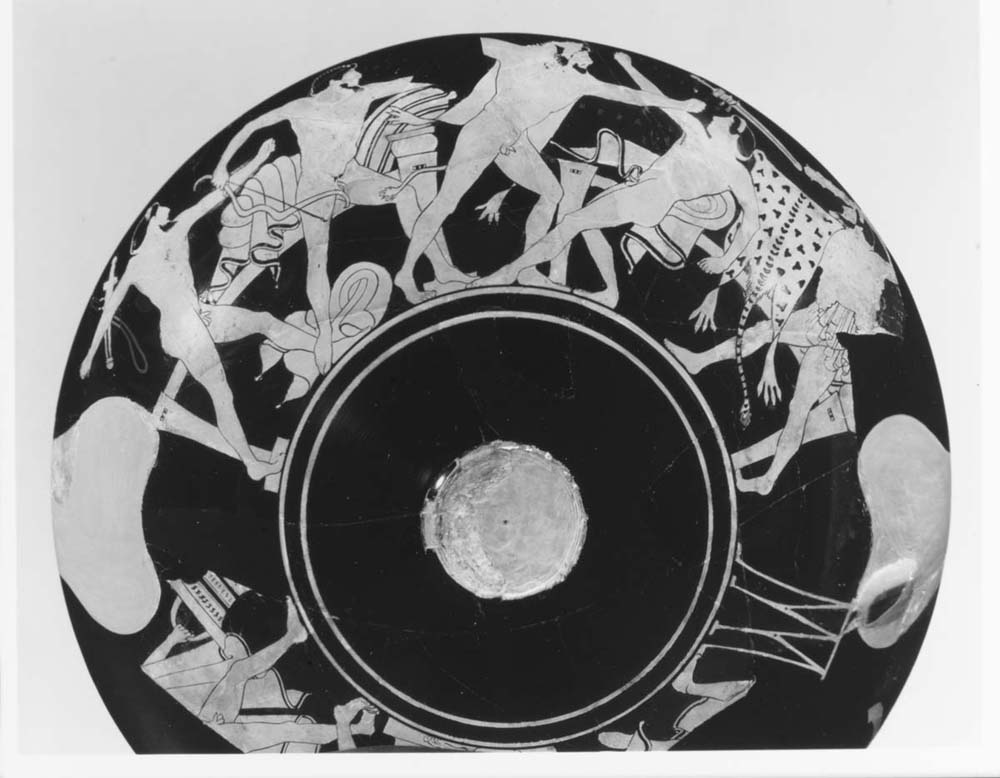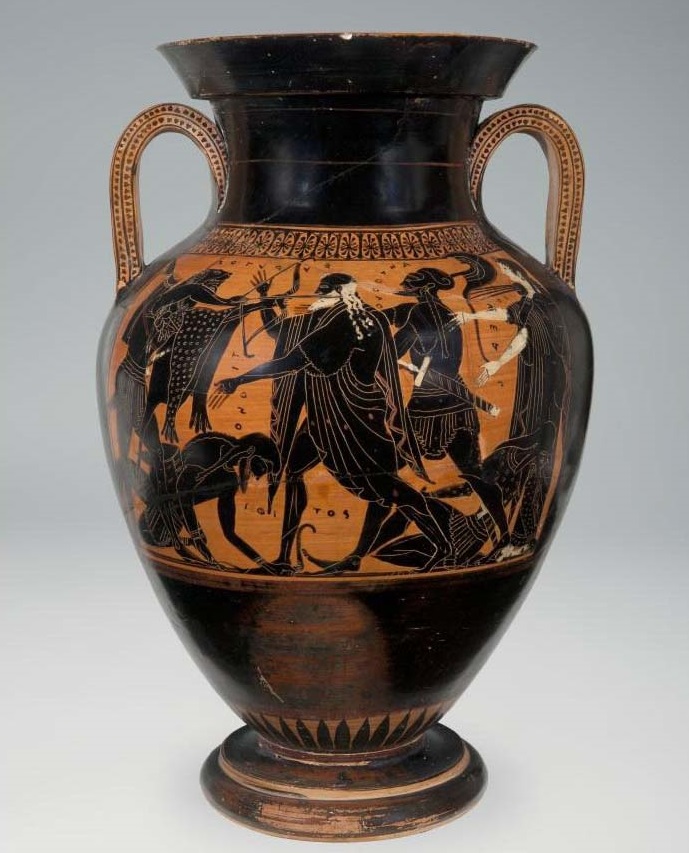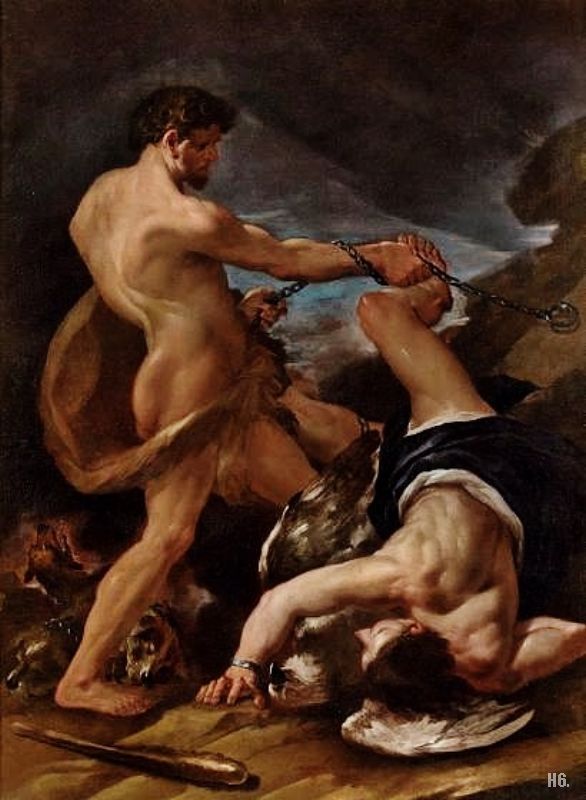Iphitus
Iphitus of Oechalia
In Greek mythology, Iphitos or Īphitus (Ancient Greek: Ἴφιτος) was an Oechalian prince and one of the Argonauts.
Iphitus was the son of King Eurytus of Oechalia and Antiope or Antioche, and thus brother to Iole, Toxeus, Deioneus, Molion, Didaeon and Clytius, also an Argonaut. He was a descendant of Oxylus.
Mythology
It is told that after Heracles finished his 12 labours, he came to Oechalia to compete in archery for the hand of Iole; he won and yet he was refused the bride by Eurytus and his sons (except Iphitus who said that Iole should be given to Heracles), on the ground that he could once more kill his offspring as he had done to his children by Megara.
Shortly after some cattle were stolen by the notorious thief Autolycus, and Heracles was held responsible; but Iphitus did not believe it and, having gone to meet him, he invited him to seek the cattle with him. Heracles promised to do so but suddenly he went mad again and he threw Iphitus from the walls of Tiryns killing him.
After killing Iphitus, Heracles would have to become a servant of Queen Omphale for several years.
There are two other versions of how Iphitus came to die at the hands of Heracles; both versions do not show Heracles in a good light.
In the Odyssey, it was said that Heracles stole 12 mares of Iphitus, and then killed the son of Eurytus when Iphitus tracked them down. Sophocles also tells of Heracles killing Iphitus simply as a form of vengeance against Eurytus for the king’s lack of hospitality.
During his search for the cattle, Iphitos met Odysseus in Messenia, befriended him, and gave Odysseus his father Eurytus's bow. More specifically, Iphitus would set out to search for the cattle. It was said that during Iphitus' search he encountered Odysseus, and presented the son of Laertes with Eurytus’ bow; a bow which many years later, Odysseus would make use of against the Suitors of Penelope.

Iphitos in Greek Mythology
Iphitos or Īphitus (Ancient Greek: Ἴφιτος) is the name of six individuals in Greek mythology.
Iphitos, son of Eurytus, king of Oechalia.
Iphitos, son of Naubolus and king of Phocis, others say his father was the son of Hippasus from Peloponessus. He entertained Jason when he consulted the Delphic Oracle and later joined the Argonauts. Iphitus also participated during the assault of the Seven against the Thebans, as the ally of the latter. He was the leader of men from Phocis and the cities of Panope, Daulis, Cyparissos, Lebadia and Hyampolis during the war. By his wife Hippolyte, Iphitos became the father of Schedius and Epistrophus who led the Phocians in the Trojan war.
Iphitos, an Elean who was killed by Copreus, son of Pelops, who fled from Elis after the murder and later on was purified by King Eurystheus in Mycenae. According to the writer Alcman, Iphitos along with Lycurgus, belonged to the participants in the first Olympic Games.
Iphitus, father of Eurynome, mother of King Adrastus of Argos, was one of the Seven Against Thebes.
Iphitos, an elderly Trojan during the Trojan War. In Book VIII of the Iliad, his son Archeptolemus suddenly becomes the charioteer of Hector when Eniopeus was killed by Diomedes. However, Teucer killed him in the same battle. In Aeneid Book II, Aeneas named Iphitos among half a dozen Trojan heroes who fight by his side during the fall of Troy. When the battle turned against them, Iphitos was the only one of these who remained standing. He was apparently by Aeneas's side until King Priam was killed. In some accounts, Iphitos was also the father of Coeranus who was killed by Odysseus.
Iphitos, king of Elis, restored the Olympic Games after the Dorian invasion. The restoration came after he asked the Oracle at Delphi about what should be done to save Greece from civil war and the diseases that were killing the population. The Oracle answered: "Iphitos and the people of Elis must declare a sacred truce for the duration of the game and revive the Olympic Games".

Sources
Apollonius of Rhodes, Argonautica 1.86
Statius, Thebaid 5.400
Hyginus, Fabulae 14
Diodorus Siculus, Bibliotheca historica 4.37.5
Scholaist on Sophocles, Trachiniae 266 as cited in Hesiod, Ehoiai fr. 79
Scholaist on Sophocles, Trachiniae 266 as cited in Hesiod, The Homeric Hymns, and Homerica, The Taking of Oechalia fr. 4
Pseudo-Apollodorus, Bibliotheca 2.6.2
Diodorus Siculus, Bibliotheca historica 4.31.3
Homer, Odyssey 21.30
Pseudo-Apollodorus, Bibliotheca 1.9.16
Valerius Flaccus, Argonautica 1.363
Homer, Iliad 2.518
Statius, Thebaid 7.354
Hyginus, Fabulae 14
Statius, Thebaid 7.340-358
Pseudo-Apollodorus, Bibliotheca 3.10.8
Pseudo-Apollodorus, Bibliotheca 2.5.1
Alcman, Lyrical Poets 25
Hyginus, Fabulae 70
Homer, Iliad 8.128
Virgil, Aeneid 2.435
Ovid, Metamorphoses 13.257
"Wikipedia"













